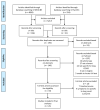Long COVID and Myalgic Encephalomyelitis/Chronic Fatigue Syndrome (ME/CFS)-A Systemic Review and Comparison of Clinical Presentation and Symptomatology - PubMed (original) (raw)
Comparative Study
Long COVID and Myalgic Encephalomyelitis/Chronic Fatigue Syndrome (ME/CFS)-A Systemic Review and Comparison of Clinical Presentation and Symptomatology
Timothy L Wong et al. Medicina (Kaunas). 2021.
Abstract
Background and Objectives: Long COVID defines a series of chronic symptoms that patients may experience after resolution of acute COVID-19. Early reports from studies with patients with long COVID suggests a constellation of symptoms with similarities to another chronic medical illness-myalgic encephalomyelitis/chronic fatigue syndrome (ME/CFS). A review study comparing and contrasting ME/CFS with reported symptoms of long COVID may yield mutualistic insight into the characterization and management of both conditions. Materials and Methods: A systemic literature search was conducted in MEDLINE and PsycInfo through to 31 January 2021 for studies related to long COVID symptomatology. The literature search was conducted in accordance with PRISMA methodology. Results: Twenty-one studies were included in the qualitative analysis. Long COVID symptoms reported by the included studies were compared to a list of ME/CFS symptoms compiled from multiple case definitions. Twenty-five out of 29 known ME/CFS symptoms were reported by at least one selected long COVID study. Conclusions: Early studies into long COVID symptomatology suggest many overlaps with clinical presentation of ME/CFS. The need for monitoring and treatment for patients post-COVID is evident. Advancements and standardization of long COVID research methodologies would improve the quality of future research, and may allow further investigations into the similarities and differences between long COVID and ME/CFS.
Keywords: COVID-19; ME/CFS; chronic fatigue syndrome; long-haul COVID-19; myalgic encephalomyelitis; systemic review.
Conflict of interest statement
The authors declare no conflict of interest.
Figures
Figure 1
PRISMA flowchart.
Similar articles
- Long-term neuromuscular consequences of SARS-Cov-2 and their similarities with myalgic encephalomyelitis/chronic fatigue syndrome: results of the retrospective CoLGEM study.
Retornaz F, Rebaudet S, Stavris C, Jammes Y. Retornaz F, et al. J Transl Med. 2022 Sep 24;20(1):429. doi: 10.1186/s12967-022-03638-7. J Transl Med. 2022. PMID: 36153556 Free PMC article. - Orthostatic Symptoms and Reductions in Cerebral Blood Flow in Long-Haul COVID-19 Patients: Similarities with Myalgic Encephalomyelitis/Chronic Fatigue Syndrome.
Campen CLMCV, Rowe PC, Visser FC. Campen CLMCV, et al. Medicina (Kaunas). 2021 Dec 24;58(1):28. doi: 10.3390/medicina58010028. Medicina (Kaunas). 2021. PMID: 35056336 Free PMC article. - A scoping review of 'Pacing' for management of Myalgic Encephalomyelitis/Chronic Fatigue Syndrome (ME/CFS): lessons learned for the long COVID pandemic.
Sanal-Hayes NEM, Mclaughlin M, Hayes LD, Mair JL, Ormerod J, Carless D, Hilliard N, Meach R, Ingram J, Sculthorpe NF. Sanal-Hayes NEM, et al. J Transl Med. 2023 Oct 14;21(1):720. doi: 10.1186/s12967-023-04587-5. J Transl Med. 2023. PMID: 37838675 Free PMC article. Review. - Transient receptor potential melastatin 3 dysfunction in post COVID-19 condition and myalgic encephalomyelitis/chronic fatigue syndrome patients.
Sasso EM, Muraki K, Eaton-Fitch N, Smith P, Lesslar OL, Deed G, Marshall-Gradisnik S. Sasso EM, et al. Mol Med. 2022 Aug 19;28(1):98. doi: 10.1186/s10020-022-00528-y. Mol Med. 2022. PMID: 35986236 Free PMC article. - Cardiovascular and haematological pathology in myalgic encephalomyelitis/chronic fatigue syndrome (ME/CFS): A role for viruses.
Nunes JM, Kell DB, Pretorius E. Nunes JM, et al. Blood Rev. 2023 Jul;60:101075. doi: 10.1016/j.blre.2023.101075. Epub 2023 Mar 20. Blood Rev. 2023. PMID: 36963989 Free PMC article. Review.
Cited by
- Post-viral fatigue in COVID-19: A review of symptom assessment methods, mental, cognitive, and physical impairment.
Campos MC, Nery T, Starke AC, de Bem Alves AC, Speck AE, S Aguiar A. Campos MC, et al. Neurosci Biobehav Rev. 2022 Nov;142:104902. doi: 10.1016/j.neubiorev.2022.104902. Epub 2022 Oct 3. Neurosci Biobehav Rev. 2022. PMID: 36202253 Free PMC article. Review. - Long-term neuromuscular consequences of SARS-Cov-2 and their similarities with myalgic encephalomyelitis/chronic fatigue syndrome: results of the retrospective CoLGEM study.
Retornaz F, Rebaudet S, Stavris C, Jammes Y. Retornaz F, et al. J Transl Med. 2022 Sep 24;20(1):429. doi: 10.1186/s12967-022-03638-7. J Transl Med. 2022. PMID: 36153556 Free PMC article. - Confirmation of COVID-19 infection status and reporting of Long COVID symptoms in a population-based birth cohort: No evidence of a nocebo effect.
Macleod-Hall CI, Munafò MR, Dyer ML. Macleod-Hall CI, et al. J Health Psychol. 2024 May;29(6):581-594. doi: 10.1177/13591053241228711. Epub 2024 Jan 25. J Health Psychol. 2024. PMID: 38269448 Free PMC article. - Functional and Morphological Differences of Muscle Mitochondria in Chronic Fatigue Syndrome and Post-COVID Syndrome.
Bizjak DA, Ohmayer B, Buhl JL, Schneider EM, Walther P, Calzia E, Jerg A, Matits L, Steinacker JM. Bizjak DA, et al. Int J Mol Sci. 2024 Jan 30;25(3):1675. doi: 10.3390/ijms25031675. Int J Mol Sci. 2024. PMID: 38338957 Free PMC article. - The importance of estimating prevalence of ME/CFS in future epidemiological studies of long COVID.
Grabowska AD, Westermeier F, Nacul L, Lacerda E, Sepúlveda N. Grabowska AD, et al. Front Public Health. 2023 Nov 3;11:1275827. doi: 10.3389/fpubh.2023.1275827. eCollection 2023. Front Public Health. 2023. PMID: 38026427 Free PMC article. No abstract available.
References
- WHO Weekly Epidemiological Update-9 March 2021 (Retrieved 17 March 2021) [(accessed on 17 March 2021)]; Available online: https://apps.who.int/iris/bitstream/handle/10665/340087/nCoV-weekly-sitr....
- CDC COVID Data Tracker (Retrieved 17 March 2021) [(accessed on 17 March 2021)]; Available online: https://covid.cdc.gov/covid-data-tracker/#cases_casesper100klast7days.
- Zhou F., Yu T., Du R., Fan G., Liu Y., Liu Z., Xiang J., Wang Y., Song B., Gu X., et al. Clinical course and risk factors for mortality of adult inpatients with COVID-19 in Wuhan, China: A retrospective cohort study. Lancet. 2020;395:1054–1062. doi: 10.1016/S0140-6736(20)30566-3. - DOI - PMC - PubMed
Publication types
MeSH terms
LinkOut - more resources
Full Text Sources
Other Literature Sources
Medical
